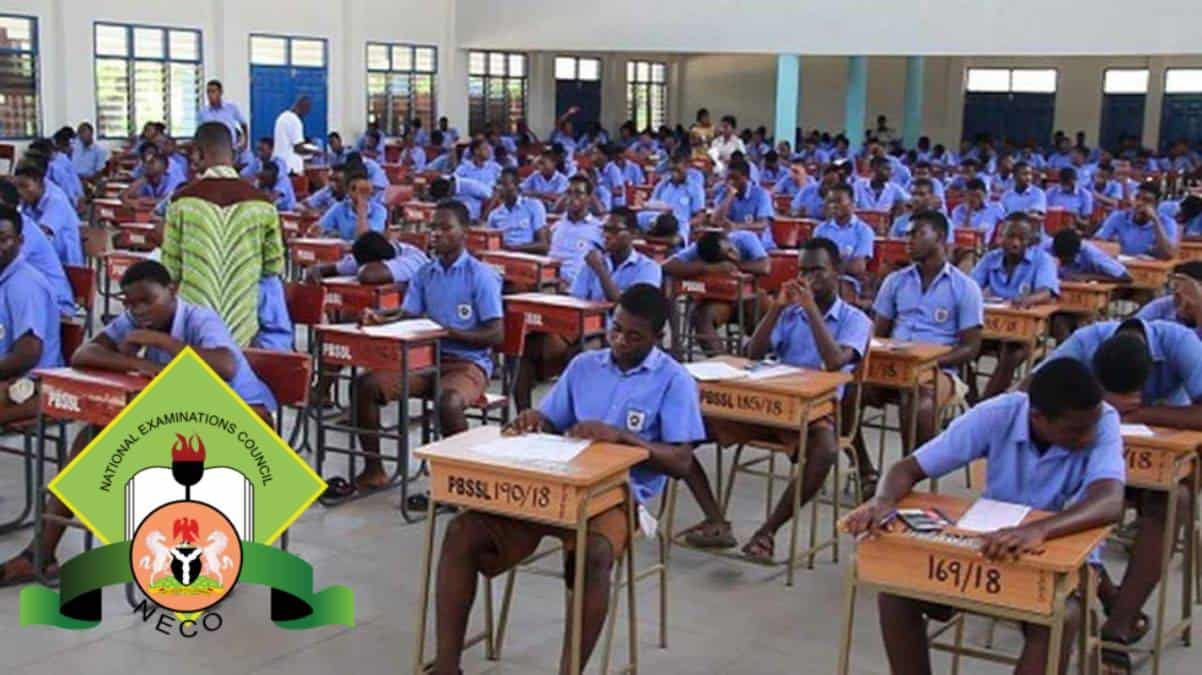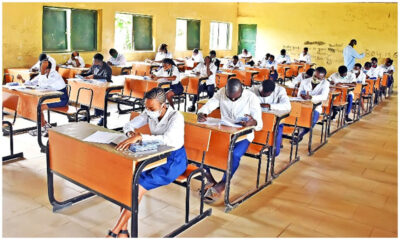Education
NECO: Candidates to pay N50,000 for certificate reprint

NECO: Candidates to pay N50,000 for certificate reprint
The National Examinations Council, NECO, says its candidates would henceforth pay the sum of N50,000 as a fee for the reprinting of certificates.
NECO Registrar, Dantani Wushishi, disclosed this in a statement in Minna, Niger State.
“The N50,000 fee for certificate reprints is subject to periodic review, he emphasised.
READ ALSO:
- Governance failure, corruption retarding Nigeria’s progress, says LP in Independence message
- N200 bribe: Police inspector reportedly stabs man to death
- Why we dropped money laundering charges against Bobrisky – EFCC
The council further said requests for reprints, “will only be accepted within one year of the original certificate issuance. After this period, the council will no longer entertain such requests.”
In addition to the reprinting policy, NECO has set a one-month deadline for candidates to submit requests for the correction of results.
NECO: Candidates to pay N50,000 for certificate reprint
Education
US University opens 2025 scholarships for international students

US University opens 2025 scholarships for international students
Montana Technological University (Montana Tech) has opened applications for its 2025 scholarships, offering international students the opportunity to pursue graduate studies in the USA.
These scholarships, available for both Master’s (MS) and PhD students, provide a tuition waiver and a competitive stipend for living expenses.
Scholarship overview and opportunities
Scholarship Region reports that Montana Technological University is offering funded Graduate Research Assistantships (GRAs) for Fall 2025. These assistantships are available for students applying to the MS and PhD programs, and they provide an opportunity to work alongside faculty on important research projects.
The university is focusing on key research areas such as advanced materials and manufacturing, critical mineral recovery and processing, environmental remediation, and biotechnology. Interested applicants are encouraged to apply soon to contribute to these cutting-edge fields.
Eligibility requirements
To apply for the Montana Tech University Scholarship 2025, candidates must meet several criteria.
- Applicants should have completed a bachelor’s degree from a recognized university.
- They must also meet the admission requirements for the program they wish to apply to and satisfy the English language proficiency requirements set by the university.
- Additionally, applicants must submit their applications for admission by January 1st to be considered for the scholarship.
READ ALSO:
- 200,000 repentant terrorists surrender, drop arms in North East – CDS
- Canadian university offers funded national scholarship program for 2025
- Israeli strikes pound central Beirut, suburbs
Benefits for scholarship winners
Students who are accepted into the MS or PhD programs at Montana Tech and are awarded a Graduate Research Assistantship will receive significant benefits. These include a
- Tuition waiver and a competitive stipend to cover living expenses.
- All applicants to available graduate programs will automatically be considered for the assistantships.
Required documents for application
Details inform that candidates applying for the Montana Technological University Scholarship must prepare several documents as part of the application process. Required documents include the;
- Application form,
- A personal statement,
- A CV, recommendation letters,
- TOEFL or IELTS scores, GRE scores, and official academic transcripts.
These documents as mentioned, are crucial for the admissions review and scholarship consideration.
Step-by-step application process
To apply for the scholarship, candidates are informed to first visit the graduate research fields page on Montana Tech’s Graduate School website. From there, they can apply for openings in the available research areas and complete the application form.
All required documents must be uploaded as part of the application. For more details and guidance, prospective students can contact the Montana Tech Graduate School at [email protected], where they will be connected with a faculty member leading a funded project.
US University opens 2025 scholarships for international students
Education
Canadian university offers funded national scholarship program for 2025

Canadian university offers funded national scholarship program for 2025
Western University has announced that applications are now open for the National Scholarship Program for the 2025-2026 academic year.
The opportunity offers funding to outstanding students with a proven track record of academic excellence, leadership, and community involvement.
According to Western University, the deadline for applications is February 14th, 2025.
Details of the program and eligibility
The National Scholarship Program is aimed at Canadian citizens and permanent residents, as well as international students meeting specific criteria. International students who are not Canadian citizens or permanent residents are eligible for the International President’s Entrance Scholarship.
Details inform that applicants must have an overall academic average of 90% or higher from their Grade 12 courses (or equivalent) and must apply for full-time studies at Western University’s main campus. Students must also be nominated by their high school.
Scholarship opportunities and amounts
The program offers various scholarship opportunities based on academic achievement and extracurricular involvement.
- The Neen Hodgins National Entrance Scholarship awards $80,000 over four years, while,
- President’s Entrance Scholarships range from $50,000 to $70,000, depending on the amount of funding available.
- For black students, the James Jenkins President’s Entrance Scholarship offers $50,000, and the Beryl Ivey Continuing Entrance Scholarship provides $92,000 over four years.
READ ALSO:
- Israeli strikes pound central Beirut, suburbs
- Robbers kill two members in shoot-out with Delta police
- French football star, Paul Pogba’s blackmail trial begin in Paris
International students have access to scholarships such as the Neen Hodgins President’s International Entrance Scholarship, valued at up to $80,000. Other awards include the Faculty Entrance Scholarships, valued at $30,000, and the National Merit Awards, which provide $2,000 for students who are interviewed but not selected for a National Scholarship or a Schulich Leader Scholarship.
Application requirements
Applicants must submit a variety of materials, including a completed online application, a transcript from their school, and a reference letter from a teacher or staff member who is familiar with their academic and extracurricular achievements.
Additionally, applicants are required to write a 1,000-1,250 word essay on an issue of public concern. The essay, along with other supporting documents, must be submitted by the February 14th, 2025, deadline.
Nomination and assessor process
The institution informs that in order to be considered for the National Scholarship Program, students must be nominated by their school. The application includes a “Nomination Request Form,” which is sent to the school administrator once completed.
Students are told to ensure that they follow up with their school to confirm that their nomination and transcript are submitted on time. Additionally, students must request one reference letter from a teacher or staff member who can assess their academic performance and involvement in extracurricular activities.
How to apply
To apply, students need to access the National Scholarship application through the online portal, using their OUAC reference number and date of birth.
- Western University advises that there may be a delay between submitting the admission application and being able to access the scholarship application, with a minimum wait time of five business days.
- Once available, students can complete the application and submit all required documents before the assigned deadline.
For further details on how to apply, visit the Western University National Scholarship application portal.
Canadian university offers funded national scholarship program for 2025
Education
Student loan: More applicants hopeful as NELFUND credits accounts

Student loan: More applicants hopeful as NELFUND credits accounts
More students across several tertiary institutions in Nigeria are optimistic of benefiting from the next batch of disbursements of the Nigerian Education Loan Fund (NELFUND), Weekend Trust gathered.
The NELFUND, established by the Students Loan Act 2023 is managed and administered by the Central Bank of Nigeria (CBN) through the money deposit banks. It aims to facilitate the mobilisation of funds to provide interest-free loans to students of tertiary institutions.
Beneficiaries are expected to begin a repayment process of 10% of their salary to be deducted at source two years after the completion of the National Youth Service Corps (NYSC), while self-employed beneficiaries are required to remit the same of their monthly profit.
The disbursement of funds is made directly to the institutions bank accounts while successful applicants are entitled to a monthly stipend of N20,000 for upkeep if they so wish.
READ ALSO:
- Why Tinubu’s reforms are causing pain – Wale Edun
- Jake Paul, Mike Tyson bag suspension after controversial Texas’ fight
- Gunmen abduct journalist’s three family members in Kogi, demand N50m ransom
Weekend Trust reports that in August, the NELFUND had released data that showed significant regional disparities in the registration, application and disbursement of funds with the South-east recording the lowest figure.
Netizens on X had accused NELFUND of neglecting universities in the South-east but the Fund refuted the claim, saying the management of tertiary institutions in the South-east had failed to respond to verification requests forwarded to them.
North-west leads in disbursement, South-west in institutions
The latest data released by NELFUND on November 7, shows that the South-west has the highest number of beneficiary institutions with 27 currently getting disbursements. This is followed by the North-west which has 18 institutions while the North-east has 16 and the South-south has 15 institutions. The North-central and South-east have 11 institutions each.
On the number of students by zone, the North-west has the highest number of students with 43,378 followed by North-east with 28, 782 and the South-west with 12,539. The North-central has 11,555 beneficiaries while the South-south has 5,837 and South-east has 4,073.
The breakdown of the funding by zones, also shows that the highest of N4,424,024,250 billion was paid to the 18 institutions in the North-west, followed by the16 institutions in the North-east which got N2,544,223,937 billion, then the 27 institutions in the South-west received N1,842,876,713billion. The 11 institutions in the North-central got N1,099,808,700 billion, while the15 in the South-south got N597,250,030 million and the 11 institutions in the South-east received 539,610,320 million.
Student loan: More applicants hopeful as NELFUND credits accounts
DAILY TRUST
-

 metro11 hours ago
metro11 hours agoBREAKING: Port Harcourt refinery begins operation
-

 Business2 days ago
Business2 days agoJust in: Dangote refinery reduces petrol price for marketers
-

 metro1 day ago
metro1 day ago40-foot container falls on car in Lagos
-

 Politics2 days ago
Politics2 days ago2027: Lagos Speaker, Obasa joins gov race, may battle Seyi Tinubu, others
-

 Politics1 day ago
Politics1 day agoLagos 2027: Seyi Tinubu campaign team releases his life documentary
-

 International1 day ago
International1 day agoTrump to sack 15,000 transgender officers from U.S. military: Report
-

 Entertainment1 day ago
Entertainment1 day agoPolygamy best form of marriage for Africa – Okey Bakassi
-

 metro1 day ago
metro1 day agoPolicewoman dismissed in Edo threatens to kill children, commit suicide












